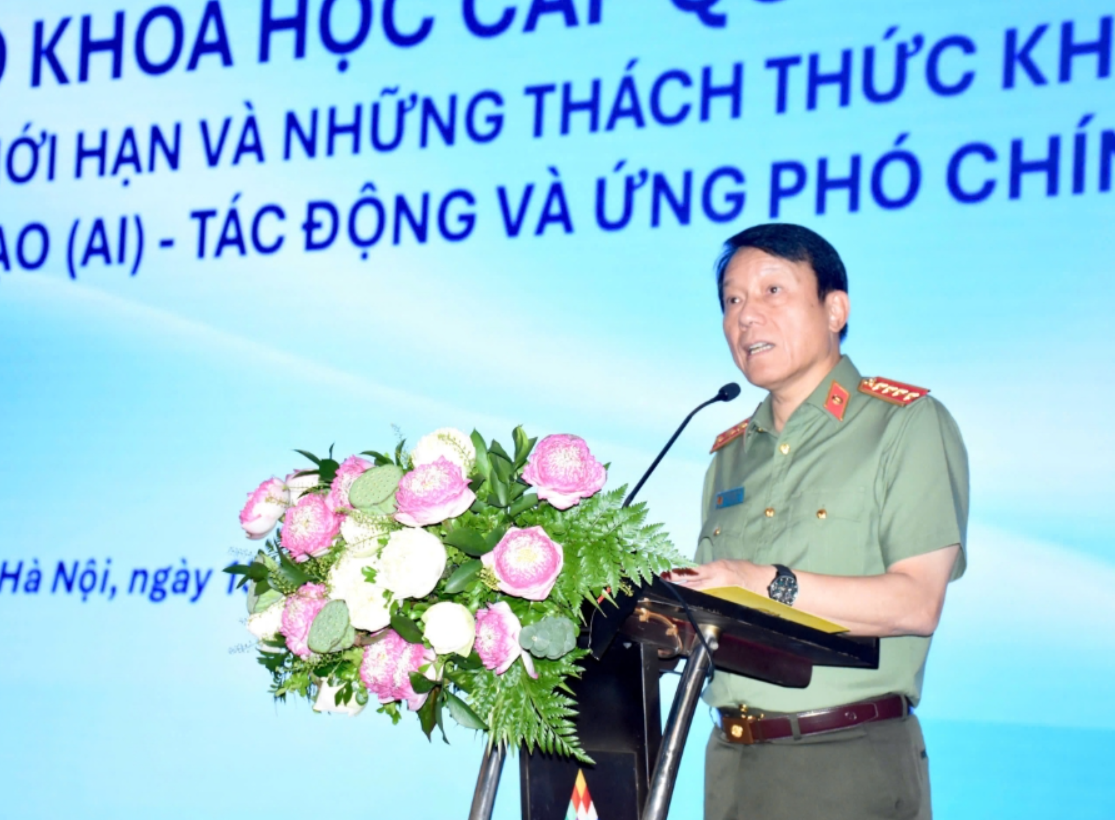AI – New Growth Engine and Challenges for Vietnam
On September 15, 2025, the Ho Chi Minh National Academy of Politics, in collaboration with the Ministry of Public Security, Ministry of National Defense, Central Theoretical Council, and the Ministry of Science and Technology, held a scientific conference on the impacts of AI and policy responses. At the event, Minister of Public Security Luong Tam Quang emphasized that Resolution 57 identifies science, technology, innovation, and national digital transformation as the “golden key” for Vietnam to escape the middle-income trap and reach developed-country status by the mid-21st century. Among strategic technologies, AI is considered a leading breakthrough, driving innovation in governance, productivity, and socio-economic growth.

Forecasts suggest that by 2030, AI could contribute up to USD 79.3 billion, equivalent to 12% of Vietnam’s GDP. The country now has hundreds of AI startups, ranking second in Southeast Asia, with 75% of businesses already applying AI in sales operations. Several major corporations have also identified AI as central to long-term competitiveness.
However, these achievements are only initial steps. Minister Quang stressed that Vietnam must address “dual challenges”: balancing development with control, innovation with discipline, integration with autonomy. This requires a long-term, comprehensive, and synchronized strategy – from legislation and infrastructure to human resources and clear national AI positioning.
From a theoretical perspective, Professor Nguyen Xuan Thang – Director of the Ho Chi Minh National Academy of Politics and Chairman of the Central Theoretical Council – noted that AI is not only reshaping labor and economic models but also influencing social structures and cultural values. AI carries “near limitless” power, becoming a new productive force in the digital age. Yet, its rapid development raises concerns: potential technological monopolies, widening inequality between nations, and even threats to long-standing humanistic values.
According to the Oxford Insights AI Readiness Index, Vietnam ranked 51st out of 188 in 2024, 9th in East Asia, and 5th in ASEAN. The government has adopted a National AI Strategy through 2030 with a vision to 2045, aiming to place Vietnam among the world’s top 10 countries in AI application. The country has also invested in AI training from undergraduate to postgraduate levels, partnered with international organizations, and built laboratories and research centers.
Still, as Nguyen Xuan Thang pointed out, Vietnam faces major gaps: a shortage of AI experts, training programs misaligned with business needs, weak computational infrastructure, underdeveloped semiconductor industry, and limited R&D funding. More critically, the legal framework for AI remains fragmented, with no dedicated AI law and insufficient safeguards for data privacy and national security.
In a world of accelerating AI competition, these limitations hinder Vietnam’s ability to produce AI products of global scale. To unlock AI’s full potential, coordinated efforts across the entire ecosystem are required – from state policy to enterprise implementation, academic research, and social engagement. Sustainable AI development must be grounded in responsibility, ethics, and a clear human-centered vision.
Ý kiến bạn đọc
Những tin mới hơn
Những tin cũ hơn
Luật sư Trần Đình Phúc: Người thầm lặng kiến tạo nên những giá trị bền vững tại Luật Nguyễn
Trong hành trình hơn 25 năm phát triển của Luật Nguyễn, bên cạnh những bước tiến mạnh mẽ và thành tựu đáng tự hào, không thể không nhắc đến những con người đã đặt nền móng và gắn bó trọn vẹn với sự nghiệp chung. Luật sư Trần Đình Phúc là một trong số ấy. 1. Người đồng hành từ những ngày đầu...
-
 How to change a yellow license plate to a white one after stopping business use
How to change a yellow license plate to a white one after stopping business use
-
 Ô tô biển vàng ngừng kinh doanh có được đổi sang biển trắng?
Ô tô biển vàng ngừng kinh doanh có được đổi sang biển trắng?
-
 Visually Impaired Individuals Can Become Lawyers if Requirements Are Met
Visually Impaired Individuals Can Become Lawyers if Requirements Are Met
-
 Người khiếm thị vẫn có thể trở thành luật sư nếu đáp ứng đủ điều kiện
Người khiếm thị vẫn có thể trở thành luật sư nếu đáp ứng đủ điều kiện
-
 Làm thế nào để hàng Việt tiếp cận thị trường toàn cầu?
Làm thế nào để hàng Việt tiếp cận thị trường toàn cầu?
- Đang truy cập91
- Hôm nay12,791
- Tháng hiện tại357,337
- Tổng lượt truy cập1,126,000













